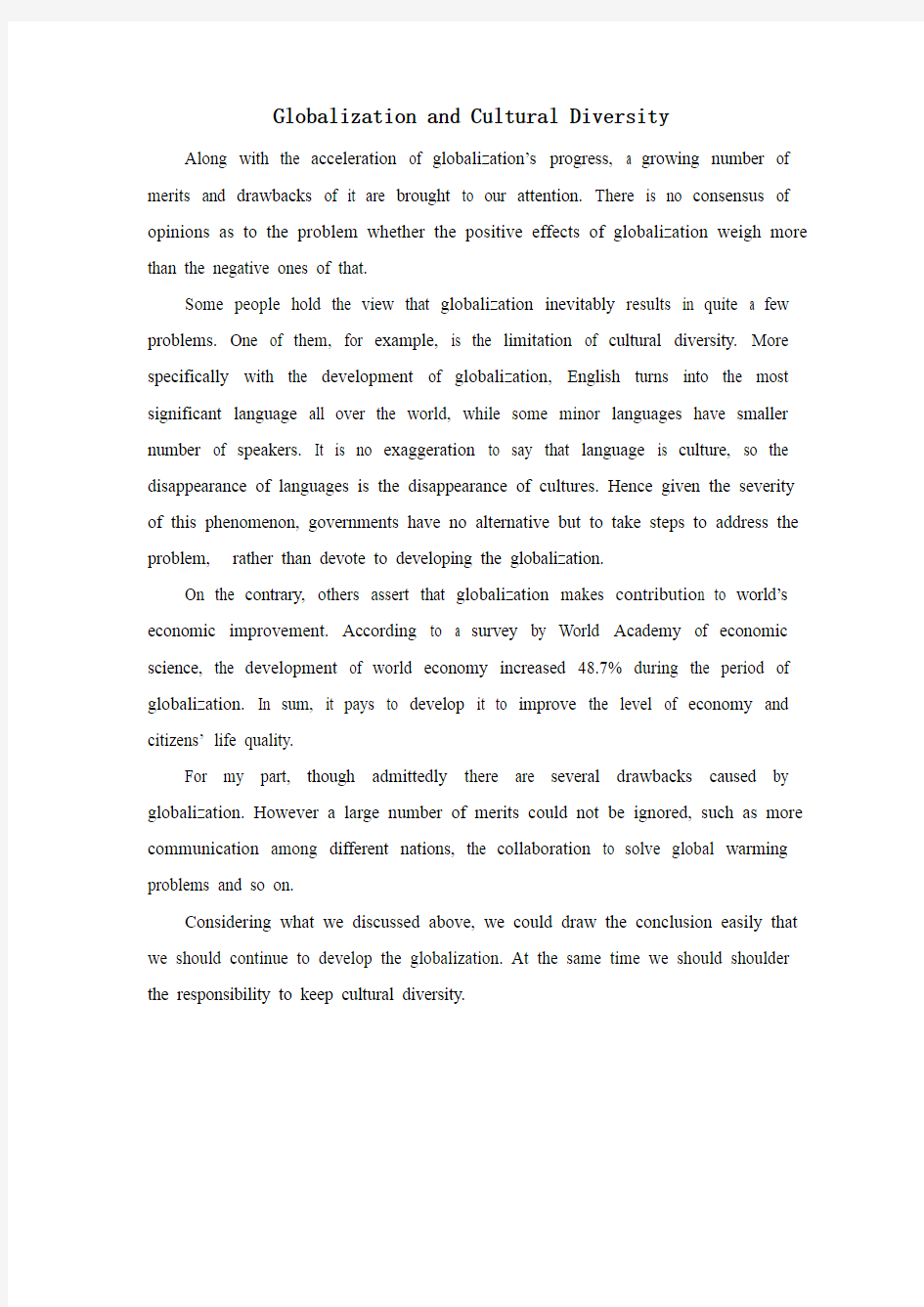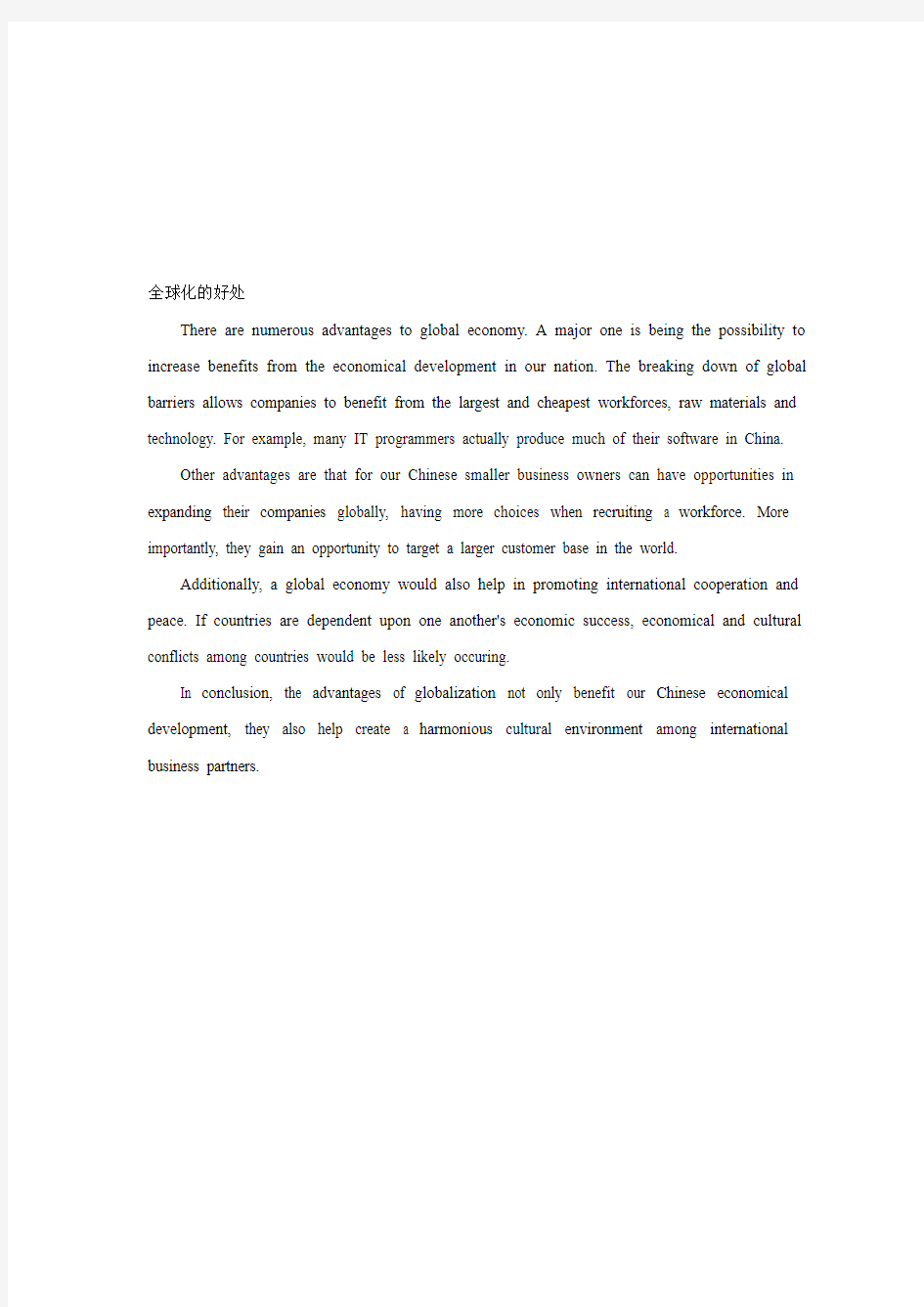

Globalization and Cultural Diversity Along with the acceleration of globalization’s progress, a growing number of merits and drawbacks of it are brought to our attention. There is no consensus of opinions as to the problem whether the positive effects of globalization weigh more than the negative ones of that.
Some people hold the view that globalization inevitably results in quite a few problems. One of them, for example, is the limitation of cultural diversity. More specifically with the development of globalization, English turns into the most significant language all over the world, while some minor languages have smaller number of speakers. It is no exaggeration to say that language is culture, so the disappearance of languages is the disappearance of cultures. Hence given the severity of this phenomenon, governments have no alternative but to take steps to address the problem, rather than devote to developing the globalization.
On the contrary, others assert that globalization makes contributio n to world’s economic improvement. According to a survey by World Academy of economic science, the development of world economy increased 48.7% during the period of globalization. In sum, it pays to develop it to improve the level of economy and citizens’ life quality.
For my part, though admittedly there are several drawbacks caused by globalization. However a large number of merits could not be ignored, such as more communication among different nations, the collaboration to solve global warming problems and so on.
Considering what we discussed above, we could draw the conclusion easily that we should continue to develop the globalization. At the same time we should shoulder the responsibility to keep cultural diversity.
全球化的好处
There are numerous advantages to global economy. A major one is being the possibility to increase benefits from the economical development in our nation. The breaking down of global barriers allows companies to benefit from the largest and cheapest workforces, raw materials and technology. For example, many IT programmers actually produce much of their software in China.
Other advantages are that for our Chinese smaller business owners can have opportunities in expanding their companies globally, having more choices when recruiting a workforce. More importantly, they gain an opportunity to target a larger customer base in the world.
Additionally, a global economy would also help in promoting international cooperation and peace. If countries are dependent upon one another's economic success, economical and cultural conflicts among countries would be less likely occuring.
In conclusion, the advantages of globalization not only benefit our Chinese economical development, they also help create a harmonious cultural environment among international business partners.
全球化不会导致文化多样性的消失
文化的多样性表现在民族文化的多样性!!!文化既是民族的也是世界的,全球化有利于加强民族意识,有利于学习个民族文化,促进本民族文化的发展!!文化多样性是历史上和当代世界的客观事实,世界上每一个国家、每一个民族都有自己的独特传统,都有自己的文化特色。然而,随着经济全球化浪潮的冲击,文化多样性受到严重的威胁。学术界自20世纪90年代以来便开始探讨文化多元化与文化全球化(或称“文化同质化”)问题,探讨的焦点是:文化是否像经济一样,形成全球文化。目前学术界存在三种意见。
第一种意见认为,有可能会形成全球文化。因为经济全球化将对各民族文化产生很大影响,全球性的互动和一体化导致差异的缩小,全球性的规范、思想和实践将压倒本地的规范、思想。有的学者赞成、主张文化全球化或国际化,并提出实践的方法。
第二种意见认为,从国家和民族文化这个角度来看,在国家和民族没有消亡之前,即在没有组成一个世界国之前,不可能有一种整合的全球文化。全球性的互动可能会导致各种文化的新融合,但全球一体化也可能激起各种不同文化传统的防范意识,并采取措施保护自己的文化,全球性规范必然会被人们根据本地传统作出自己的解释,因此,美国没有办法实现全球性的文化霸权。
第三种观点认为,创造力和跨文化接触以很快的速度创造着文化,随着全球化的推进,这种创新也会加快。也就是说,文化创新比文化同质化的步伐要快得多,因此,最终获胜的是文化多样性。
经济全球化与文化多样性之间的关系是一种互动的关系。全球各国、各地交往速度的加快,互动频率的增多,促使人们进一步了解文化的多样性,同时也促使不同文化之间发生接触和冲突。在接触或冲突过程中,不同文化之间必然相互影响,相互渗透,强势文化对弱势文化的影响更大,渗透更深,但不可能形成全球同质性的文化。在国家和民族没有消亡之前,民族文化的独特性将会长期存在。
总的来说,经济全球化趋势似乎不可阻挡。然而,文化与经济不同,文化多样性或多元化趋势仍将长期存在。